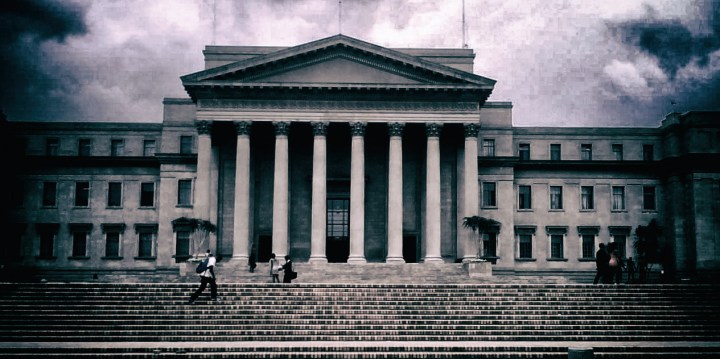Coronavirus
Judgment reserved as students fight order to close Wits dorms over Covid-19 case

Two students at the University of the Witwatersrand brought an urgent application in the Johannesburg High Court on Wednesday to stop the university from evacuating dormitories before all residents had been tested for Covid-19. The university closed early for the Easter break and ordered the evacuation of the dormitories after a student at the medical school tested positive for the virus.
As the 72-hour deadline for leaving university dorms looms, two law students, Lerato Moela and Matsobane Shaun Mathlwana, brought an urgent application against Wits University Vice-Chancellor Adam Habib and Dean of Students Jerome September to stop them from evacuating residences.
The students asked the court to order the university to refrain from evacuating students without proof that they had been tested for Covid-19 and that it was safe for them to go home. They also wanted the evacuation notice to be extended until a mechanism was found to limit the rapid spread of the virus.
Moela said in his affidavit that he was a resident at the university’s West Camp Village. On 6 March students received an email from the university informing them of the global status of the virus and measures to combat its spread. Five days later the university deactivated its biometric system and distributed hand sanitiser to key areas. Shortly afterwards they were informed that a student had tested positive for the virus after being in contact with someone who came home from Italy who had also tested positive.
On Sunday night Wits cancelled contact classes and closed dormitories provisionally until March 29.
Moela said there were “potentially 40,000 students” who could have had contact with the infected student.
He argued in papers before the court that it was reckless to let the students loose on broader society” as they could spread the virus if they were infected.
Moela said closing the dormitories was a “negligent and reckless response to this pandemic”.
The university opposed the application.
September said in papers before court that it “seemed as if [Moela and Mathlwana] labour under the impression that the vice-chancellor and I have some control over the testing for Covid-19 and that we can arrange for students to be tested. This is wrong”.
He said the National Institute for Communicable Diseases was responsible for testing and had a protocol in place. He said sending all students in dormitories for private testing would cost the university more than R48-million.
“Restrictions on testing are important as testing centres would be overwhelmed and would not cope,” he said. “It would run the risk of producing false results and waste scarce resources. This could have an adverse impact on the fight against the pandemic.”
September said it was the prerogative of each student to be tested and the university could not compel anybody to do so.
He said that acting on expert advice, the university had come to the conclusion that social distancing was the best way to stop the spread of the virus.
“The irony of what the applicants seek is that the very thing they complain about is the thing that will limit the spread of Covid-19.”
He said the viral load in students was low at present.
“But the longer we wait, the greater the risk. This is precisely why experts agree that students should be sent home sooner rather than later,” September said.
September said 639 students had already left the dormitories.
He said the other problem faced by the university was that it was informed by organised labour that workers were no longer prepared to clean the dormitories as the infection risk was too high. He said keeping the dormitories open would create risk for both students and workers.
September said in papers before the court that he was convinced that self-isolation was the solution and dramatically reduced risk.
He dismissed allegations that the university was negligent in dealing with the Covid-19 outbreak.
In a narrative detailing how contact tracing is done, September explained how they traced the point of infection and those who were potentially in touch with the first-year medical student who tested positive for the virus.
“On Sunday 8 March the student met an individual who returned from Italy. They hugged and then they took a walk around the park.
“The next day she collected lecture notes from the fifth floor and studied in room 29 on the third floor. She had limited contact with other students.
“On 10 March she collected lecture notes from the fifth floor and studied in room 29 on the third floor. In the afternoon she attended a skills session on the third floor. She was working at station 9.
“On 11 March she was not at the university. The next day she was informed that her friend tested positive for Covid-19. The student informed her course co-ordinator and she was doing well, but self-isolating. The student did not live in the university’s dormitories.
“This was communicated with others in her class. On March 15 she tested positive for Covid-19. All first-year medical classes were cancelled and the students were instructed to self-isolate.”
The court has reserved judgment. MC
"Information pertaining to Covid-19, vaccines, how to control the spread of the virus and potential treatments is ever-changing. Under the South African Disaster Management Act Regulation 11(5)(c) it is prohibited to publish information through any medium with the intention to deceive people on government measures to address COVID-19. We are therefore disabling the comment section on this article in order to protect both the commenting member and ourselves from potential liability. Should you have additional information that you think we should know, please email [email protected]"






 Become an Insider
Become an Insider